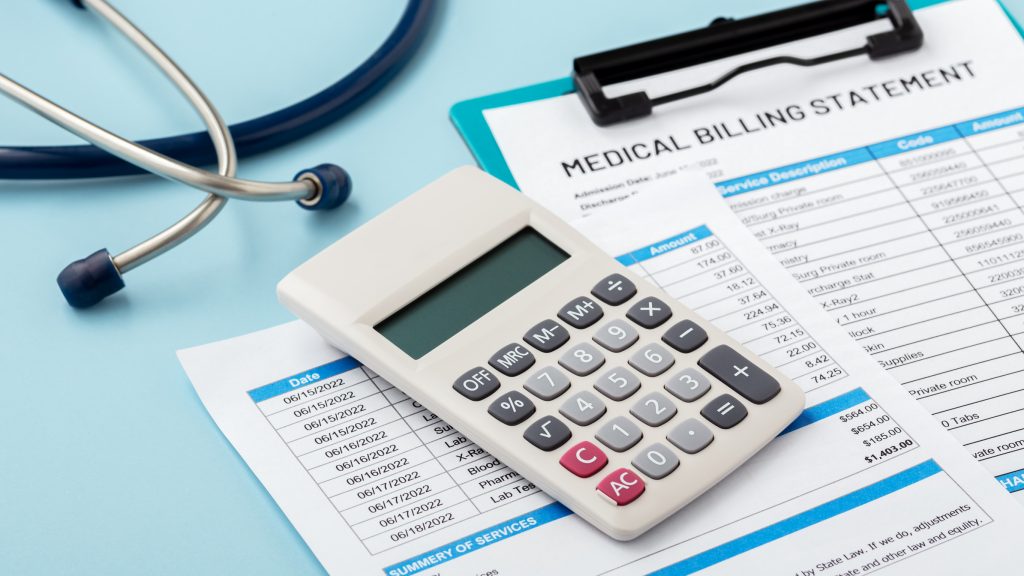
Medical debt can be crushing. In fact, 58.5% of respondents to a 2019 study published in the American Journal of Public Health said medical expenses contributed to their bankruptcy. Don’t let medical debt destroy your life. Here are 10 ways to reduce your debt and work on repayment without losing your sanity.
1. Review Your Bills
Did you know that medical bills often contain mistakes? Medical Billing Advocates of America has estimated that three-quarters of medical bills contain some type of error. It’s important to review your bills item by item and look for errors. You should use your bill as well as your explanation of benefits (EOB) from your health insurance provider, if you have insurance.
Sometimes you can be charged for the same service twice or be charged for something you didn’t receive. It’s important to be aware of the care you’re receiving. For example, in the hospital, try to keep track of medications you’re taking, tests you receive, and any procedures. Being your own advocate is essential to keeping track of your medical expenses. This way, you’ll be prepared if medical bills are incorrect.
2. Look Up Fair Pricing
Did you know that you can look up the Fair Market Value of medical services? Using the Healthcare Bluebook, you can research what services actually cost. This way, you can make sure that your bill is accurate and fair.
3. Dispute Surprise Billing
Did you know that surprise medical billing is heavily regulated and is illegal in some states? Sometimes this is called balance billing. If you receive a large bill from an out-of-network provider, your insurance may not cover it. You will then be billed for the balance. The No Surprises Act (NSA) took effect on January 1, 2022, and aims to protect patients from unexpected high costs when receiving certain medical services, particularly emergency care and care from out-of-network providers at in-network facilities.
4. Put It in Writing
If you dispute a bill or coverage with your provider or insurance, make sure to put it in writing. For example, if an insurance claim is denied, you can request that the claim be reviewed internally. If it is still denied, you are entitled to an external review as well. These requests should be made in writing, and you should keep a copy for yourself. Making sure that your insurance company pays for its share is critical in reducing what you owe. The same is true if you dispute a charge with your doctors or a hospital. Always create a paper trail so that you can refer to it later if the dispute goes unresolved.
5. Negotiate
Sometimes, if you can’t pay your medical bill, you can apply for a lower payment due to hardship. You may have to fill out paperwork to apply and disclose things like your income to qualify. However, this can significantly reduce what you owe and lower payments so that it’s within your means. Be aware that you’re more likely to get financial assistance before you miss payments, so it’s best to be proactive about this and not let your medical bills go into collections.
You may want to speak to a medical billing advocate to help you negotiate your bills and correct any errors. The AdvoConnection Directory and the Alliance of Claims Assistance Professionals can help you find a medical billing advocate, but you may need to pay a fee.
6. Ask for a Discount for Upfront Payment
If you can pay the bill upfront, ask if you can get a discount for doing so. This reduces administrative costs for your provider. So, they are usually willing to discount your bill. This is especially true if it’s a large bill because your provider wants to receive payment promptly.
7. Set Up a Payment Plan
If you can’t pay your bill in its entirety, many providers will let you set up a payment plan without interest. This is much better than paying off the debt on a credit card and paying unnecessary interest. Usually, payment plans can range from months to years, depending on your provider.
8. Find Support
Do you have a lot of unexpected medical expenses? You don’t have to drown in debt. Several charitable organizations help individuals pay for their medical debt. For example, the HealthWell Foundation helps those who are underinsured to pay copays, premiums, deductibles and out-of-pocket expenses.
9. Consolidate Debt
If you have a lot of different medical bills, it may make sense to consolidate the debt. This will give you one monthly payment. However, you may have to pay interest if you take out a personal loan, for example.
10. Prioritize Other Debt
Medical debt may not be as pressing as mortgage payments or credit card bills. Not paying these could make you lose your house or bring down your credit score. Some medical debt won’t hurt your credit. For example, Equifax, Experian and TransUnion recently announced they will stop noting medical debt in collections under $500. Furthermore, the Consumer Financial Protection Bureau (CFPB) finalized a rule in January 2025 that prohibits most medical debt from appearing on credit reports.
How has medical debt affected your financial health? Let us know your experience in the comments.
Read More
8 Utility Bill Cuts That Your Service Providers Are Willing To Give If Only You’d Ask
4 Reasons Teaching Kids to Garden Is a Great Low-Cost Educational Experience
10 Ways to Crush Medical Debt Without Destroying Your Life is a post from: Beating Broke, if you enjoy it, please visit us and subscribe to the Feed.







